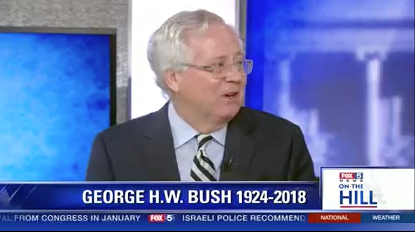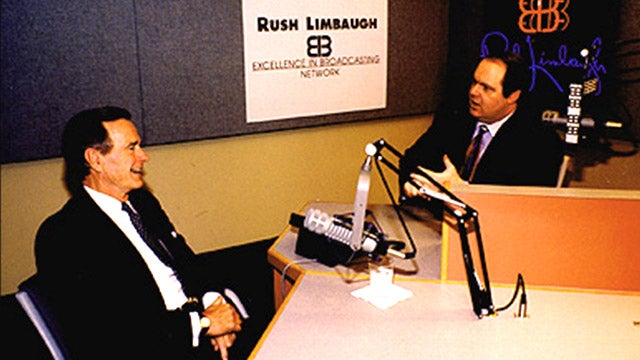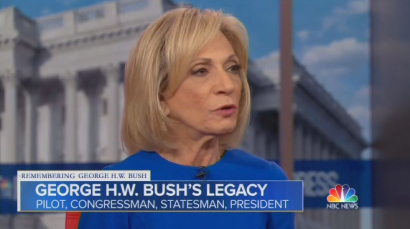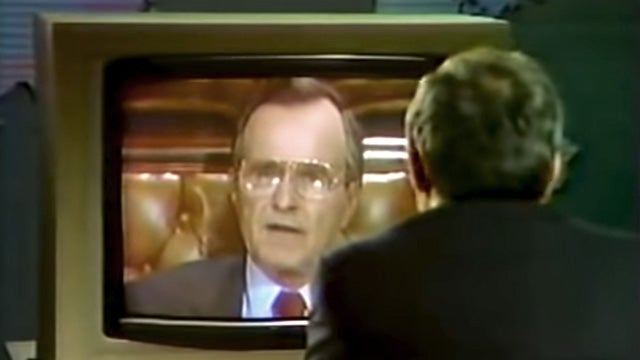RUSH: During his presidency, George H. W. Bush — 1989 to ’93 — the media routinely attempted to portray President Bush as in that AP tweet: A “patrician.” He was an elite. He was way out of touch with the American people. He didn’t have the slightest idea what suffering was. He had no idea what personal pain is. He had no idea what it was like to struggle in life, and they’d use pictures of Bush on the golf course or on his speedboat off of Kennebunkport or recreating.
I never met anybody that recreated more or better than George H. W. Bush. The guy was always out doing something. He could have been the recreator-in-chief in addition to being the president of the United States. And each time he engaged in these activities, which he had done all of his life, the media used the pictures to illustrate how out of touch he was. Well, he was born into a wealthy family. But he decided to eschew that, and he left the Northeast, and he went out to sell tools for the oil business.

He wanted to get in the oil business. He got a job in Bakersfield, California, selling tools that had to do with oil drilling and oil exploration, ended up in Odessa and Midland, Texas. And there was one honest story about this that I think ran shortly before he ran for president 1988 or maybe during his first term. The title is… I don’t know where it was, but the title was story was “How Bush Made It,” and it detailed how he struck out on his own and left the guarantees that his family offered.
He wanted to be in Texas. And even after moving to it was and raising a family in Texas, they still called him a Northeasterner. They said, “He moved to Texas as a means of trying to fool people into believing he was a real guy.” Don’t fall for all of this stuff today and the past weekend about how the media had such respect, ’cause he was like any other Republican. He was the enemy to them. He was somebody to be defeated. He was somebody to be mischaracterized, and they did everything they could along predictable lines as a way of doing it.
They were constantly pressuring him to violate campaign promises.
It was no different than when any other president, any other Republican is in the White House. An audio sound bite here just to give you a slight flavor for some of this. This was Sunday in Washington on a local Fox affiliate. The host is talking to U.S. News & World Report editor Brian Kelly. Question: “George H. W. Bush was somebody who really kind of stood as the last classic Republican in a lot of ways because what followed him was very, very different from what he established. Can you talk about that and the effect that he had on creating a movement in the Republican Party that we still see today?”
 KELLY: You had that clip, “Read my lips: No new taxes.” Well, he did raise taxes, and that set in motion huge forces. It gave us Newt Gingrich, it gave us Rush Limbaugh, it gave us the Republican, uhh, dissident movement. A lot of people think he really got taken to the cleaners by the Democrats in the 1990 budget deal, and that really was a cornerstone. And ultimately when he lost the election because of that, Bill Clinton didn’t beat him. Ross Perot beat him.
KELLY: You had that clip, “Read my lips: No new taxes.” Well, he did raise taxes, and that set in motion huge forces. It gave us Newt Gingrich, it gave us Rush Limbaugh, it gave us the Republican, uhh, dissident movement. A lot of people think he really got taken to the cleaners by the Democrats in the 1990 budget deal, and that really was a cornerstone. And ultimately when he lost the election because of that, Bill Clinton didn’t beat him. Ross Perot beat him.
RUSH: I always thought that these people believed Bill Clinton was responsible for my show’s success. This is the first I’ve heard that George H. W. Bush is the reason I succeeded, because he broke his promise, “Read my lips: No news taxes,” and raised taxes. I remember this. I talked to him about this, and I got frustrated. I’ll be honest. He was telling me what a nice, honest guy he thought Tom Foley was. I’ll get to this in a minute.
He said, “Yeah, there’s some of these Democrats, Rush, we can work with. We have to work with ’em — and Tom Foley? I think he’s a good guy.”
I said, “What do you think about George Mitchell?”
He said, “George Mitchell is the most partisan man in Washington.”
I said, “Well, there we go,” ’cause that was actually true. George Mitchell was the Senate majority leader I think before Puff Daschle came along, and he was like every other Senate Democrat majority leader, very soft-spoken, always using the word “concerned.” (impression) “We’re very concerned, Tim,” and behind the scenes these guys were vicious, vicious partisans but were never portrayed that way.
But it was what it was, and I remember a lot of people had a problem with that budget deal in 1990. But this is the first I heard that this gave us me and Newt Gingrich. But you see, that, to these people, is not praise, because giving rise to me and Newt Gingrich is tantamount to giving rise to Trump. Nothing to be proud of. I had Bush on my radio show in September of 1992 during the campaign. I asked him why he thought people were feeling so negatively about the economy.
PRESIDENT BUSH: I think they’re feeling negative about the economy because they hear 92% of the coverage on the television — where a lot of people get their news from — on the economy has been negative. There are some good things. Interest rates are down. People aren’t being robbed by inflation anymore. Inventories are down. We have it… I think we’re poised from it dramatic recovery.

RUSH: Yeah, well, the Democrats and Clinton came out calling it “the worst economy in the last 50 years,” and people were believing it. I got calls from people who thought, “It can’t get any worse, Rush,” and it wasn’t bad at all. But it was typical media coverage. Anyway, he was right about 92% negative coverage on the economy. Ninety-two percent negative coverage on Trump. Nothing’s changed.
BREAK TRANSCRIPT
RUSH: Oh, don’t be concerned. Everything that would have been discussed today had not there been the death of George H. W. Bush will be discussed. I’ve got the Stack ready to go. Just a couple of more things here. Grab audio sound bite No. 5. This is a great illustration of why all of the fawning today. Don’t forget, the fawning today is just like it was during the McCain funeral. All of this is aimed at doing whatever the media can to continue to cast a negative light on the character and the presidency of Trump.
Make no mistake about this. Here’s Andrea Mitchell, NBC News, Washington, on Meet the Press yesterday. Chuck Todd says, “He broke the ‘no new taxes’ pledge in 1990. Four years later, Newt Gingrich Speaker of the House. It’s a seminal moment, you could argue, in the shift of the Republican Party from where it was then,” which was great, man! Republicans raising taxes? That’s great! That’s what we need to get back to. That’s why Bush was great. Bush told his own party to go pound sand and raised taxes. He was the last great Republican!
Here’s Andrea Mitchell, NBC News, Washington, admitting it…
 MITCHELL: Economically breaking that pledge showed the character and resolve of the man to do what he was persuaded was the right thing to do economically even though he knew at the time that it might guarantee that he’d be a one-term president.
MITCHELL: Economically breaking that pledge showed the character and resolve of the man to do what he was persuaded was the right thing to do economically even though he knew at the time that it might guarantee that he’d be a one-term president.
TODD: That was the last time a president could get away with raising… Before that, Republicans regularly would raise taxes when necessary. Ronald Reagan did it.
RUSH: Right. (translated) “So this is the last great Republican, the last great Republican who actually was persuaded to do the right thing. Even though he knew it might guarantee he’d be a one-term president, it was the right thing to do. That’s what we want! We want more Republicans who are gonna raise taxes, ’cause the Democrats know what that means.” Well, the 1990 budget deal, it was a bad deal.
But here are the details that people may not remember. In 1990, Bush was desperate to get a budget from a Senate and House. The Democrats controlled both. He needed money for the defense budget. He needed to fund military operations in the first Gulf War, which went from August of 1990 to February of 1991. And he had to relent. So he agreed to a compromise which increased several existing taxes. So you could technically say there weren’t any “new taxes.”
But everybody knew what the “no new taxes” meant was “I’m not gonna raise taxes,” and he did. But that was the pressure that was brought to bear. And as part of the compromise, the Democrats promised to never use his broken promise against him, and they didn’t — for about nine months, until the ’92 campaign came along and then that’s all they talked about was how Bush broke his promise to the Republican Party. There’s another thing, too, and I just want to remind people of this one.
This was a classic. And one of the things that’s being said today is that Bush was the last decent Republican, the last dignified Republican, the last time Republicans could be proud of someone in the White House, even including his own son. They’re going back and reminding everybody what a great time it was. “Dignity! There was respect for the media in the White House. There was none of this name-calling like we get today.”
Well, maybe the media has forgotten this, although Dan Rather hasn’t. This is January 25, 1988, on CBS Evening News. Dan Rather is interviewing Vice President George H. W. Bush and during the interview… It was about the Iran-Contra affair, and Dan Rather was attempting to say that George Bush knew that the Iran-Contra affair was a bad deal. He was simply being loyal to President Reagan but he knew it was a bad deal and he participated in a bad deal and he had a lot of explaining to do, and this is what happened…
RATHER: I don’t want to be argumentative, Mr. Vice President.
VICE PRESIDENT BUSH: (chuckles) Yeah?
RATHER: No, sir, I don’t.
VICE PRESIDENT BUSH: This is not a great night because I want to talk about why I want to be president, why those 41% of the people are supporting me, and I don’t think it’s fair to judge —
RATHER: And, Mr. Vice President, these questions are —
VICE PRESIDENT BUSH: — a whole career… It’s not fair to judge my whole career by a rehash on Iran. How would you like it if I judged your career by those seven minutes when you walked off the set in New York?
RUSH: All right. Now, that — at the time — had never been done. Somebody actually giving it back, face-to-face to somebody in the media. Dan Rather had walked off the CBS Evening News set in a tizzy when a tennis tournament went long, and CBS decided to stick with coverage of the tennis tournament, thereby cutting his precious newscast short. When Rather learned that they were gonna do that, he walked off the set, and it made big news.
So here was Dan Rather giving George H. W. Bush a lot of grief over his hypocrisy and participation in the so-called Iran-Contra scandal, and George H. W. Bush turned it right around — and to this day, Dan Rather has not gotten over this. It went on to define Dan Rather, and I think the ultimate attempted reciprocity for this was Rather’s story on Bush’s son, George W. Bush, and that totally manufactured National Guard story that CBS tried to push, and for which Rather got fired. So when George H. W. Bush had to mix it up with the media, he did, and he triumphed in that instance there with Dan Rather.
 Some people want to weigh in here. Let’s get started with that. Pittsburgh. This is Ed. Welcome to the program, sir. Hi.
Some people want to weigh in here. Let’s get started with that. Pittsburgh. This is Ed. Welcome to the program, sir. Hi.
CALLER: Good afternoon, Rush. How are you today?
RUSH: I’m good. Thank you, sir.
CALLER: I just want to echo some of what you mentioned in the sound bites. I do believe that, unfortunately, the passing of 41 is being used by the media to create a narrative, and it’s to create a narrative that is against our current president and, again, in favor of what they do believe should be how a Republican should act.
RUSH: Right. A Republican should lose. A Republican should make deals with Democrats. This is how Republicans get praised by the Drive-By Media. “Make a deal with Democrats and go against your party,” i.e., raise taxes,” and we will praise you to the hilt. Become a one-term president and lose to a serial philanderer? It’s exactly what we wanted. We will say the greatest things in the world about you when you die.” But, see, this is the thing, Ed.
They didn’t treat Bush this way when he was president, like they’re trying to act like they did not. They gave him grief for the way he lived his life, they gave him grief for the way he was born, they gave him grief for driving around speedboats. They gave him grief for the Gulf War for kicking Saddam out of Kuwait. “No blood for oil.” They said that was what Bush was doing was not worth the loss of American lives.
The Democrat Party was joining with environmentalist wackos on this, and saying that Bush had a secret deal to prosper and benefit because Bush was in the oil business and so everything he was doing, even losing American lives, was so he could profit personally. Everything they continue to do today that they’re doing with Trump and this Russia collusion, they tried to do with Bush during the Gulf War I with his ties to oil. It’s really frustrating to watch this stuff, if you have a memory and remember the way he was treated when he was president.
CALLER: You hit exactly again my point in terms of the media wants you to have the shortest memory possible. I do remember the negative media portrayal of both him and his son during their presidencies as, you know, “These people can’t think, they can’t do this, they can’t do that.” It really is a part, again, of a broader narrative. It’s always part of the narrative, and I just want people to start to really appreciate what they’re doing in terms of how the public is being manipulated.
RUSH: Yeah. Well, that is pretty much, I think, a conclusion more and more people are drawing. In fact, did you…? Ed, you’re in Pittsburgh. Did you watch the Steelers game last night?
CALLER: Unfortunately. I call ’em two games. The first half was very enjoyable. The second half not so.
RUSH: You know what I was watching? I thought I was watching… Was Robert Mueller the referee in this game last night? They missed two calls that led to two Chargers touchdowns, and everybody today is underplaying it. “Well, the Steelers still could have overcome those.” I mean, blatant calls that they missed, big time, that led to 14 points. I said, “For crying out loud, we can’t get a break with referees wherever they are, media, special counsel, and at the Steelers game last night.” But it’s all part of the narrative that you say is being constructed here.

I never fails — and it’s eminently predictable. The one thing about the Bushes that frustrated people, particularly George W. Bush, is they never fought back against any of it. And President Bush didn’t, either. You know why? And this is, I think, not just generational, but it is also a sign of the genuine class that these people had. Their view of the presidency was that it is bigger than the occupant, and that the president of the United States is actually a steward of a constitutional office, one of the most important in the land.
I can remember George W. Bush telling me a number of times when I would plaintively ask why. In private conversation, he would rip these people to shreds and always get you to agree to off-the-record before he started talking about things. Even at fundraisers, he made sure that everybody there was aware that everything he said he was off the record. He’s two different people when he was talking to people privately or fundraiser/donor gatherings and so forth.
Then you see the guy on TV as president and you think it’s two different people.
I asked, “Why do you hold back in public?”
He said, “Because I’m not gonna sully the office of the presidency by taking it down into the gutter where politics is,” and that was the belief that they had, father and son, about the importance of the office.
I said, “Well, what about the people ripping you to shreds? What are they doing to the reputation of the office? What are they doing to the dignity of the office by this routine character assassination of you?”
He said, “That’s fine, that’s the way it works, but I’m not gonna get down in the gutter to respond to them that way,” and neither did his dad.
Ed, thanks for the call.


